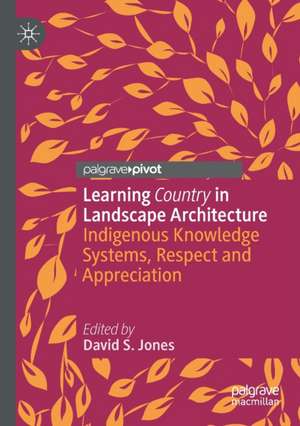Learning Country in Landscape Architecture: Indigenous Knowledge Systems, Respect and Appreciation
Editat de David S. Jonesen Limba Engleză Paperback – mar 2022
| Toate formatele și edițiile | Preț | Express |
|---|---|---|
| Paperback (1) | 445.59 lei 6-8 săpt. | |
| Springer Nature Singapore – mar 2022 | 445.59 lei 6-8 săpt. | |
| Hardback (1) | 456.10 lei 6-8 săpt. | |
| Springer Nature Singapore – 28 feb 2021 | 456.10 lei 6-8 săpt. |
Preț: 445.59 lei
Nou
Puncte Express: 668
Preț estimativ în valută:
85.27€ • 89.43$ • 70.98£
85.27€ • 89.43$ • 70.98£
Carte tipărită la comandă
Livrare economică 02-16 aprilie
Preluare comenzi: 021 569.72.76
Specificații
ISBN-13: 9789811588785
ISBN-10: 9811588783
Pagini: 122
Ilustrații: XXVI, 122 p. 15 illus.
Dimensiuni: 148 x 210 mm
Greutate: 0.21 kg
Ediția:1st ed. 2021
Editura: Springer Nature Singapore
Colecția Palgrave Macmillan
Locul publicării:Singapore, Singapore
ISBN-10: 9811588783
Pagini: 122
Ilustrații: XXVI, 122 p. 15 illus.
Dimensiuni: 148 x 210 mm
Greutate: 0.21 kg
Ediția:1st ed. 2021
Editura: Springer Nature Singapore
Colecția Palgrave Macmillan
Locul publicării:Singapore, Singapore
Cuprins
1. Introduction – Surveying the Australian Landscape.- 2. Country.- 3. Indigenous Knowledge Systems and Education in Australia.- 4. Professional Accreditation Knowledge and Policy Context.- 5. Learning Environments and Contexts.- 6. Student and Graduate Voices.- 7. Respecting Country and People: Pathways Forward.
Notă biografică
David S. Jones oversights Strategic Planning and Urban Design with the Wadawurrung Traditional Owners Aboriginal Corporation, and is Adjunct Professor at Griffith University and Professor (Research) with Monash University. With academic and professional qualifications in urban planning, landscape architecture and cultural heritage, he has taught, researched and published extensively across these areas over the last 30 years, including in Indigenous Knowledge Systems. He has been involved with the Victoria Square / Tarntanyangga Regeneration Project (2017), the Adelaide Park Lands and Squares Cultural Landscape Assessment Study (2007), the Museum Victoria’s Forest Gallery (1995-1996), the North Gardens Indigenous Sculpture Landscape Master Plan (2019), Geelong’s Changing Landscape (2019), Re-casting Terra Nullius Blindness (2017), and has co-contributed chapters to The Handbook of Contemporary Indigenous Architecture (2018), and Heal theScar – Regenerative Futures of Damaged Landscapes (2020).
Kate Alder, a MLArch graduate of Deakin University, is working as a strategic planner at the Maribyrnong City Council in Melbourne.
Shivani Bhatnagar, a MLArch graduate of Deakin University, is working as a landscape architect at the practice of Moir Landscape Architecture in Newcastle.
Christine Cooke, a MPlan(Prof) graduate of Deakin University, and a doctoral candidate there researching ‘Indigenous Knowledge awareness guidance provision and fluency in Australian planning education’.
Jennifer Dearnaley, a MLArch and PhD graduate of Deakin University, her PhD thesis is entitled Wadawurrung Ethnobotany as synthesised from the research of Louis Lane, co-author of the refereed article Aboriginal uses of seaweeds in temperate Australia, and she is Director of practice of Balyang Consulting in Geelong.
Marcelo Diaz, a MLArch graduate of Deakin University, is working as a landscape architect at the practice of MINT Pool and Landscape Design in Melbourne.
Hitomi Iida, a MLArch graduate of Deakin University, is working as a landscape architect at the practice of Kihara Landscapes in Melbourne.
Anjali Madhavan Nair, a MLArch graduate of Deakin University, is working as a landscape architect at the practices of Ground Ink in Sydney.
Shay-lish McMahon, an Awakabal woman, a MLArch graduate of Deakin University, is working as the Indigenous Services Advisor for the practice of GHD Woodhead in Melbourne, and is co-author of a refereed conference paper entitled Aboriginal voices and inclusivity in Australian land use Country planning.
Mandy Nicholson, a Wurundjeri women, a PhD candidate at Monash University researching ‘Being on Country off Country’, is co-author of several refereed publications including Wurundjeri-al Biik-u (Wurundjeri Country), Mag-golee (Place), Murrup (Spirit) and Ker-up-non (People): Aboriginal living heritage in Australia’s urban landscapes, and works at Tharangalk Art-Bunjil's Country.
Uncle Bryon Powell, a Wadawurrung Elder, formerly Chief Executive Officer and Chair of the Wadawurrung Traditional Owners Aboriginal Corporation Board, a sessional teacher at Deakin University, and co-authored the refereed chapter entitled Welcome to Wadawurrung Country.
Gareth Powell, a Wadawurrung man, an ACT-based barrister, is a Board member of the Wadawurrung Traditional Owners Aboriginal Corporation,and co-author of the refereed article Kim-barne Wadawurrung Tabayl: You are in Wadawurrung Country.
Sayali G Rahurkar is a MLArch graduate of Deakin University, and is working as a landscape architect at the practice of Inspiring Place in Hobart.
Susan Ryan, a MPlan(Prof) graduate of Deakin University, and a doctoral candidate there researching ‘Deconstructing the colonial view of Wadawurrung Country; knowledge drawn from John Wedge’s Field Books of 1835-1836’, and author of a refereed conference paper entitled Wadawurrung Landscapes in the Victoria Planning Processes.
Nitika Sharma, a MLArch graduate of Deakin University, and is working as a landscape architect at the practice of Mexted Rimmer in Geelong.
Yang Su, a MLArch graduate of Deakin University, and is working as a landscape architect at Melbourne practice.
Oshadi L Yapa Appuhamillage is a MLArch graduate of Deakin University, and is working as a landscape architect at Thomson Hay Landscape Architects in Ballarat.
Caracteristici
Reviews key international and Australian landscape architecture and Indigenous Knowledge Systems literature and current discussions Incorporates an applied real-world case study of educational practice in the built environment sector Offers key teaching and professional practice applied exemplars upon which to scaffold a learning experience Authorship includes the voices of many of the Indigenous peoples directly involved
